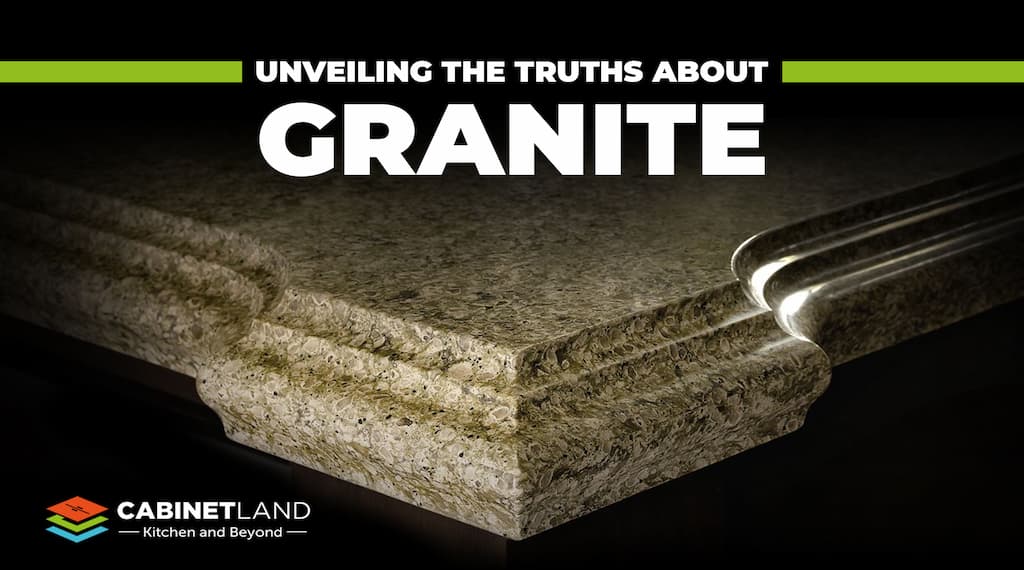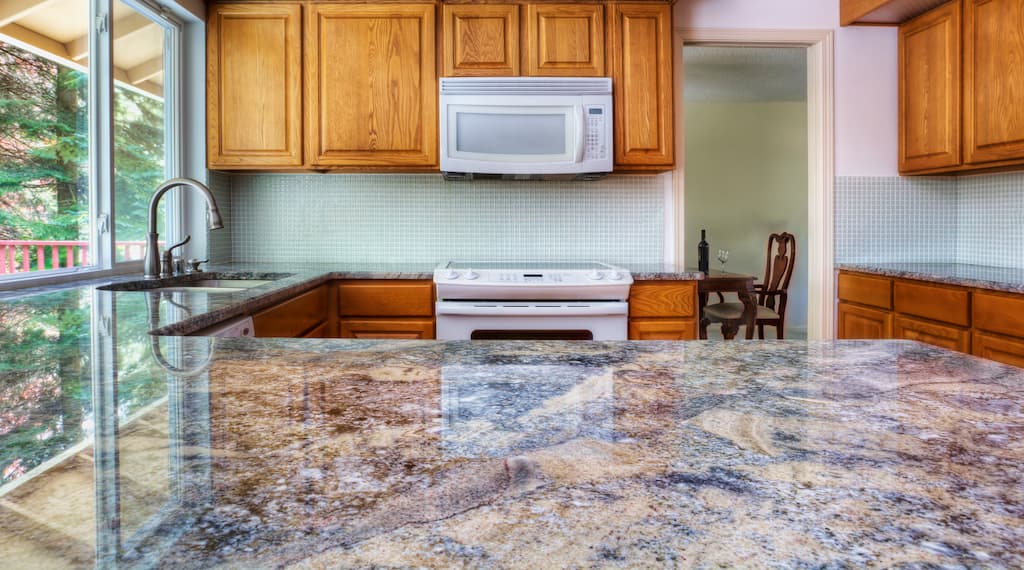Granite, a natural stone prized for its beauty and durability, is formed from cooled magma and comprises mainly quartz and feldspar. Its safety, resilience to scratches, heat resistance, and unique appearance make it a popular choice for countertops, flooring, and other applications in homes. Despite concerns, granite is considered safe for home use, including food preparation, as long as it is properly sealed and maintained. It requires minimal maintenance, such as regular cleaning and periodic sealing, to preserve its aesthetic appeal and functionality.
Table of Contents
ToggleWhat is Granite?
Granite is a natural stone formed from the cooling of magma in the Earth’s crust. This composition gives granite its unique speckled appearance and a range of colors from pink to gray. It is composed mainly of quartz and feldspar with minor amounts of mica, amphiboles, and other minerals. Granite is known for its hardness and durability, making it resistant to scratches and heat, which is why it’s a popular choice for granite kitchen countertops, flooring, and other high-traffic areas in homes. Its natural beauty and longevity have made it a favored material in construction and remodeling projects for centuries.
Is Granite Safe for Home Use?
Granite is a popular choice for countertops and other home surfaces due to its durability and aesthetic appeal. Regarding safety, granite is generally considered safe for home use. However, concerns have arisen over the potential for granite to emit radon gas, a naturally occurring radioactive gas that can have health implications at high concentrations.
Radon is produced by the decay of uranium found in the Earth’s crust, and since granite is a natural stone, it can contain varying amounts of uranium. Despite this, numerous studies have shown that the amount of radon gas emitted by granite countertops is minimal and significantly lower than the levels considered harmful by the Environmental Protection Agency (EPA). The EPA states that the primary source of radon in homes is the soil beneath them, not granite or other building materials.
Furthermore, the Marble Institute of America has conducted multiple studies to assess the radon emission levels of various granite samples. The findings consistently show that granite used in homes does not significantly contribute to indoor radon levels. The risk of radon exposure from granite countertops is very low compared to the natural background of radon found outdoors.
Regarding other safety aspects, granite is known for its hardness and resistance to scratching, heat, and other forms of wear and tear, making it a practical and durable option for kitchens and bathrooms. Sealing granite countertops periodically prevents staining and maintains their appearance and hygiene.
In conclusion, while it’s prudent to test indoor air quality for radon regardless of the materials used in your home, granite is considered safe for home use. The benefits of durability, heat resistance, and aesthetic appeal make granite popular for many homeowners.
Can Granite Countertops Withstand Kitchen Heat?
Yes, granite countertops are renowned for their ability to withstand kitchen heat. Granite is formed under intense heat and pressure beneath the Earth’s surface, making it naturally resistant to high temperatures. This characteristic allows it to tolerate heat from hot pots, pans, and baking dishes without being damaged or weakened.
You can place hot cookware directly on granite surfaces without fearing cracking or discoloration, a common issue with less durable countertop materials. However, it’s always recommended to use trivets or hot pads as a precaution to preserve the finish and maintain the beauty of the granite over time.
Granite’s thermal tolerance is a testament to its durability and contributes to its popularity as a material for kitchen countertops. Its ability to resist heat up to approximately 480 to 1200°F (248.889 to 648.888°C) makes it ideal for high-temperature environments like kitchens. Despite this resilience, sustained exposure to extreme heat could potentially cause harm over time, so precautionary measures are still advised for the longevity of the countertop.
Granite countertops can withstand the heat encountered in kitchen settings, making them a practical and stylish choice for homeowners who value functionality and aesthetic appeal.
How Food Safe is Granite?
Granite countertops are highly regarded for their durability and aesthetic appeal in kitchens worldwide. Regarding food safety, granite is considered a safe surface for meal preparation. Its natural hardness and lack of porosity make it less likely to harbor bacteria and other pathogens than more porous countertop materials.
To ensure granite remains food-safe, proper maintenance and care are crucial. Here are key points to consider:
- Sealing: It can still absorb liquids if not properly sealed, although granite is less porous than materials like marble. Most granite countertops are sealed during installation to prevent the absorption of liquids that could harbor bacteria. It’s recommended to reseal granite countertops periodically—typically once a year—to maintain their resistance to absorption and ensure a hygienic surface for food preparation.
- Cleaning: Regular cleaning is essential to keep granite countertops food-safe. Use warm, soapy water or a cleaner designed for granite to clean the surface after food preparation. Avoid harsh chemicals or abrasive cleaners that can damage the sealant or the stone. Promptly cleaning up spills, especially acidic substances like vinegar or lemon juice, can also help maintain the integrity of the granite.
- Avoiding Direct Cutting: Cutting directly on its surface can dull kitchen knives and potentially leave behind microscopic scratches where bacteria can reside, while granite is scratch-resistant. Using a cutting board is recommended to preserve both the countertop’s integrity and the cleanliness of the food preparation area.
Granite countertops provide a durable and safe surface for food preparation when properly sealed and maintained. Their low porosity and ease of cleaning make them an excellent choice for kitchens, contributing to a hygienic environment where food safety is a priority.
What Maintenance Does Granite Require?
Granite countertops are prized for their beauty and durability but require some maintenance to keep them looking their best. Here’s what you need to know to maintain your granite surfaces:
- Regular Cleaning: For daily cleaning, use warm water, mild dish soap, and a soft cloth or sponge. Avoid acidic or abrasive cleaners, which can etch the surface or damage the sealant.
- Sealing: Granite is naturally porous, so it’s essential to apply a sealant to prevent stains and bacteria from penetrating the surface. The frequency of sealing depends on the granite’s porosity and the amount of kitchen activity, but generally, it’s recommended once a year. To test if your granite needs sealing, sprinkle a few drops of water on the surface; if it beads up, the seal is good; if it soaks in, it’s time to reseal.
- Stain Removal: They can often be removed with a paste made from baking soda and water for oil-based stains or baking soda and hydrogen peroxide for water-based stains if stains occur. Apply the paste to the stain, cover it with plastic wrap, and let it sit for a few hours or overnight before washing away.
- Avoiding Heat Damage: Although granite can withstand heat, extreme temperature changes can cause cracks. Use trivets or hot pads under pots and pans to avoid direct heat contact.
- Preventing Scratches: Use cutting boards instead of cutting directly on granite. Although granite is scratch-resistant, sharp objects can damage the sealant or leave behind micro-scratches where bacteria can accumulate.
- Spills: Wipe up spills immediately, especially acidic substances like wine, coffee, fruit juices, tomato sauce, or cooking oils, which can stain or etch the surface if left unattended.
Following these maintenance steps, your granite countertops can remain a beautiful and functional part of your kitchen for many years.
Is Granite Truly Indestructible?
The term “indestructible” might overstate its resilience, while granite is renowned for its toughness and durability. Granite, a natural stone formed from cooled volcanic magma, is one of the hardest materials available for countertops. It’s resistant to scratches, heat, and many forms of wear and tear that other countertop materials can’t withstand. Here are some key points about granite’s durability:
- Scratch Resistance: Granite scores a 6 to 7 on the Mohs scale of mineral hardness, making it resistant to scratches. Kitchen knives and utensils are unlikely to damage it under normal use.
Heat Resistance: Granite can withstand temperatures up to approximately 480 to 1200°F (248.889 to 648.888°C). This makes it safe to place hot pots and pans directly on its surface without the risk of scorching or cracking under typical kitchen use. Prolonged exposure to temperatures exceeding this limit could potentially cause damage, so it’s still recommended to use trivets or hot pads to protect the surface.
- Stain Resistance: When properly sealed, granite is also resistant to stains. Its porosity can vary, so spills should be wiped up promptly, and the surface should be resealed periodically to maintain its stain-resistant properties.
- Cracking and Chipping: While it’s tough, granite is not flexible and can crack or chip if struck with sufficient force, such as a heavy object dropped on an edge. Repairs are possible but can be noticeable.
- Chemical Sensitivity: Granite can react to highly acidic substances or harsh chemicals, which may etch the polish or degrade the sealant.
Granite is an extremely hard and durable material that will last many years without losing its aesthetic appeal with proper care and maintenance. However, like any natural stone, it has its limits and vulnerabilities. Calling granite “indestructible” might ignore these potential issues, but it is an exceptionally resilient material for all practical purposes in a kitchen environment.
What is The Real Cost of Granite Countertops?
The cost of granite countertops can vary widely depending on several factors, including the stone’s quality, the installation’s complexity, and geographic location. On average, homeowners expect to pay between $40 to $100 per square foot for the material alone. High-end or exotic granite selections increase the price to $150 to $250 per square foot installed.
This price typically includes the slab, fabrication, installation, and edging. Factors such as the thickness of the granite, edge profiles, and whether the design requires any custom cuts or unique inclusions, like a sink or stovetop, can also affect the final cost. Installation complexity, such as a kitchen with multiple corners or a large island, could increase labor costs. Additionally, geographical location affects labor rates and, thus, the overall cost. Homeowners need to get quotes from multiple providers to compare prices and understand the specific cost breakdown for their projects.
Conclusion
Granite’s natural beauty, durability, and practical blend make it a sought-after material for kitchen countertops and other home installations. While it is not indestructible, with proper care, granite surfaces can withstand the rigors of daily use, retaining their elegance for years. The cost of granite countertops varies, influenced by the granite quality, design complexity, and installation requirements, but it remains an investment in your home’s long-term value and enjoyment. Whether for a kitchen remodel or new construction, granite offers an unmatched combination of durability, beauty, and value.





